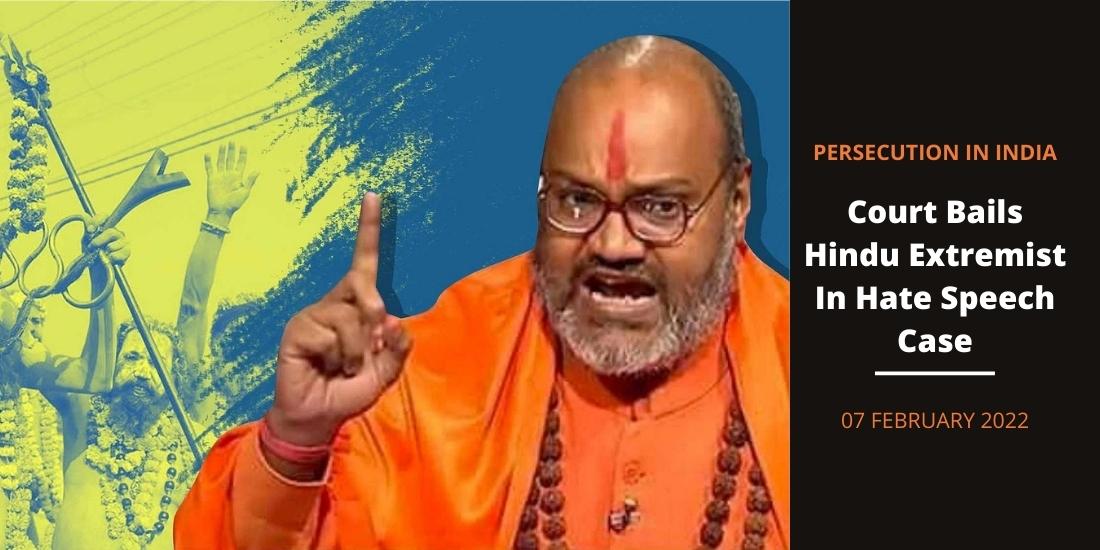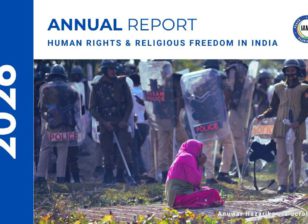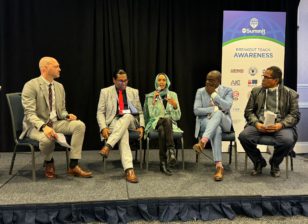Muslim Students Segregated From Their Classmates After Extremists Wield Knife At Them; Hindu Extremist Students March To Protest Hijab
As Karnataka state’s anti-hijab debate continues to escalate, Muslim hijabi students at Government PU College have finally been allowed back onto campus, but are now being segregated into separate classes, isolated from their peers.
This discriminatory segregation is a clear attempt to continue dehumanizing, punishing, and ostracizing Muslim students over their choice to wear the hijab.
The students were allowed entry to the school soon after an alarming incident, where a group of people was caught wielding a knife near the protesting students. Three of the people escaped; two were arrested and are being held in judicial custody rather than police custody, continuing the trend of administering only bare-minimum punishment to Hindu extremists who threaten violence against Muslims.
Protests have erupted across Karnataka over colleges’ discriminatory ban on hijab, which Muslim students have been protesting for over a month now, and verbal attacks and intimidation against hijabi students ramped up over the weekend.
Despite the fact that the Indian Constitution clearly guarantees freedom of religion to all Indians, hijabi students have been viciously attacked by teachers, Hindu supremacist students, and even leaders of the BJP, all of them demanding the students to remove their hijabs or be kicked out of their classrooms indefinitely.
Over the weekend, college girls in the Hindu extremist attire of saffron scarves marched in protest of Muslim students wearing hijab, chanting the Hindu religious slogan “Jai Sri Ram,” which has been weaponized by extremists to intimidate Muslim and Christian minorities. They were supported by male Hindu extremist college students, who also joined the anti-hijab protests, sporting saffron scarves.
“If you let them wear hijab, we too will wear the saffron shawl and attend classes. That is equality. Even if they don’t allow us, we will still go,” declared one extremist student when interviewed.
Some senior government leaders, including members of Parliament Shashi Tharoor and Rahul Gandhi, have slammed Karnataka schools for allowing religious expression only for Hindu students. “There is no law banning religious forms of dress,” Tharoor said in a tweet.
BJP leaders, on the other hand, have seized the opportunity to continue spreading anti-Muslim hatred, accusing the hijabi students of wanting to become terrorists and implying that they should go to Pakistan if they wanted to wear hijab.
“There is no scope for such things (wearing hijab in classrooms). Our government will take stringent action. People have to follow the rules and regulations of the school. We will not allow Talibanisation (of the education system),” said BJP state chief Nalin Kumar Kateel. “This is India and our country is founded on the Indian culture. We have already given them Pakistan on the basis of religion for them to wear Hijab.”
“Everyone comes to college to be able to secure a good job, but these students want to come to college to sport their hijabs. If you want, you (students) wear a hijab or a burqa or a skull cap or pyjamas. But, don’t go to school, go to a madrassa then,” said BJP MP Pratap Simha.
Yati Narsinghanand, Hindu Extremist Leader Who Called For War Against Muslims, Granted Bail In Hate Speech Case
Vitriolic Hindu supremacist leader Yati Narsinghanand, who was arrested on January 16 for spewing hate speech at a Hindu supremacist event in Haridwar city in December 2021, has been granted bail by a court in Uttarakhand state, allowing the militant Hindu supremacist to continue spewing hatred against Muslims with no consequences.
At the hate speech event in December, Narsinghanand, who is the influential leader of a 400,000-strong group of Hindu ascetics, called for a “war against Muslims” and urged Hindus to take up weapons to ensure that “a Muslim doesn’t become the Prime Minister in 2029.” He also promised monetary rewards of up to one hundred million rupees for any young people who were willing to fight.
Despite directly supporting other speakers who called for a genocide against two million Muslims, Narsinghanand walked free for weeks. Police initially reported that they had arrested him for making derogatory comments about Hindu women, and seemingly tacked on hate crime charges afterwards, demonstrating how little effort was put into holding Narsinghanand accountable for condoning genocide.
The court, explaining its flimsy reasoning for granting him bail, stated that Narsinghanand could not remain in jail because the police complaint he was arrested for was filed by an individual who was not actually present at the Haridwar event – despite the fact that there is ample video evidence of Narsinghanand’s hate speech, as well as videos of him supporting other hate speakers at the event.
“Therefore, instead of denying him bail on the basis of sub-judice criminal cases, (he should be granted bail as) bail is a rule and jail is an exception,” the court said.
Washington-Based Media Watchdog Demands Release Of Kashmiri Journalist Fahad Shah
The Committee to Protect Journalists (CPJ), a prestigious Washington-based media watchdog, has slammed the Indian government for the arrest of Kashmiri journalist Fahad Shah, the founding editor of ‘The Kashmir Walla’ news portal. Shah was arrested on February 4 for “sedition” and making statements that caused “public mischief.” Three days before his arrest, he and other journalists were questioned by the police for “incorrect reporting” over a gunfight in Kashmir’s Pulwama district.
“The arrest of Fahad Shah shows Jammu and Kashmir authorities’ utter disregard for press freedom and the fundamental right of journalists to report freely and safely,” said Steven Butler, CPJ’s Asia program coordinator.
Kashmir has suffered brutal occupation by the Indian military for decades. It is an increasingly dangerous place to be a reporter, journalists say. While India is overall backsliding on press freedoms due to crackdowns from Modi and the BJP, Kashmir has faced the most severe suppression of press freedom.
A report released by the Rights & Risks Analysis Group (RRAG), a New Delhi-based think tank, stated that the highest number of journalists/media organizations targeted was in Jammu and Kashmir, with 25 attacks on individuals and news outlets reported in 2021.
Chief Of Paramilitary Hindu Extremist Group RSS Claims Hindu Nationalism Is Part Of India’s Constitution
Mohan Bhagwat, chief of the dangerous BJP-linked paramilitary Hindu extremist group Rashtriya Swayamsevak Sangh (RSS), declared on February 6 that Hindu nationalism, or Hindutva, is reflected in the Indian Constitution.
“All inclusive and all encompassing truth is what we call Hindutva. It is our national identity. We talk about secularism, but it existed in our country for years, and before the constituting [of] the Constitution, and it’s because of Hindutva,” he said.
Hindutva, far from being “inclusive,” is a century-old political ideology that RSS leaders modeled off European ethno-fascism, specifically Nazism. Supporters of Hindutva hold that India should be a Hindu nation rather than a secular democracy, and that non-Hindu Indians should be either treated as second-class citizens or subjected to mass violence.
Nathuram Godse, the man who murdered Mahatma Gandhi, was a radical Hindu supremacist who held membership with the RSS. Prime Minister Modi is also a longtime supporter of Hindutva and Hindu supremacy, having joined the RSS at the age of eight. The BJP is the political arm of the RSS, using its authority in government to channel anti-Muslim hatred into discriminatory policies.
The Indian Constitution, meanwhile, very clearly declares that India is a secular, pluralistic nation, codifying the right of every Indian to freely practice their own religion.
New Vice Chancellor Of Jawaharlal Nehru University Supported Muslim Genocide, Attacked Sikh Farmers On Twitter
The new Vice Chancellor of India’s prestigious Jawaharlal Nehru University, Santishree Dhulipudi Pandit, was outed as a vicious Hindu supremacist after several of her hateful tweets were circulated by students and journalists. Pandit has used her Twitter account to call Gandhi’s murder a “solution,” Muslims and other activists “jihadists,” and Sikh farmers “parasites.”
“Do it like the Chinese with these mentally ill jihadists,” she said in one tweet, implying that India should adopt a policy of state-sponsored genocide against Muslims, similar to the ongoing Uyghur genocide in China.
Pandit is also known for being an open supporter of the Nazi-inspired RSS, the organization that spearheads India’s national Hindu supremacist movement.
Upon being appointed as Vice Chancellor of JNU, she also declared that one of her priorities would be “constructing Indo-centric narratives” – which is generally understood as warping Indian history to be Hindu-centric, demonizing Muslims as bloodthirsty conquerors, whitewashing Sikhism as a subset of Hinduism rather than a separate religion, and dismissing Christians as foreigners.
The fact that someone as openly hateful and supportive of violence genocide against minorities as Pandit can retain a senior position at such a prestigious university speaks to the way Hindu supremacy has become normalized in Indian academia.




